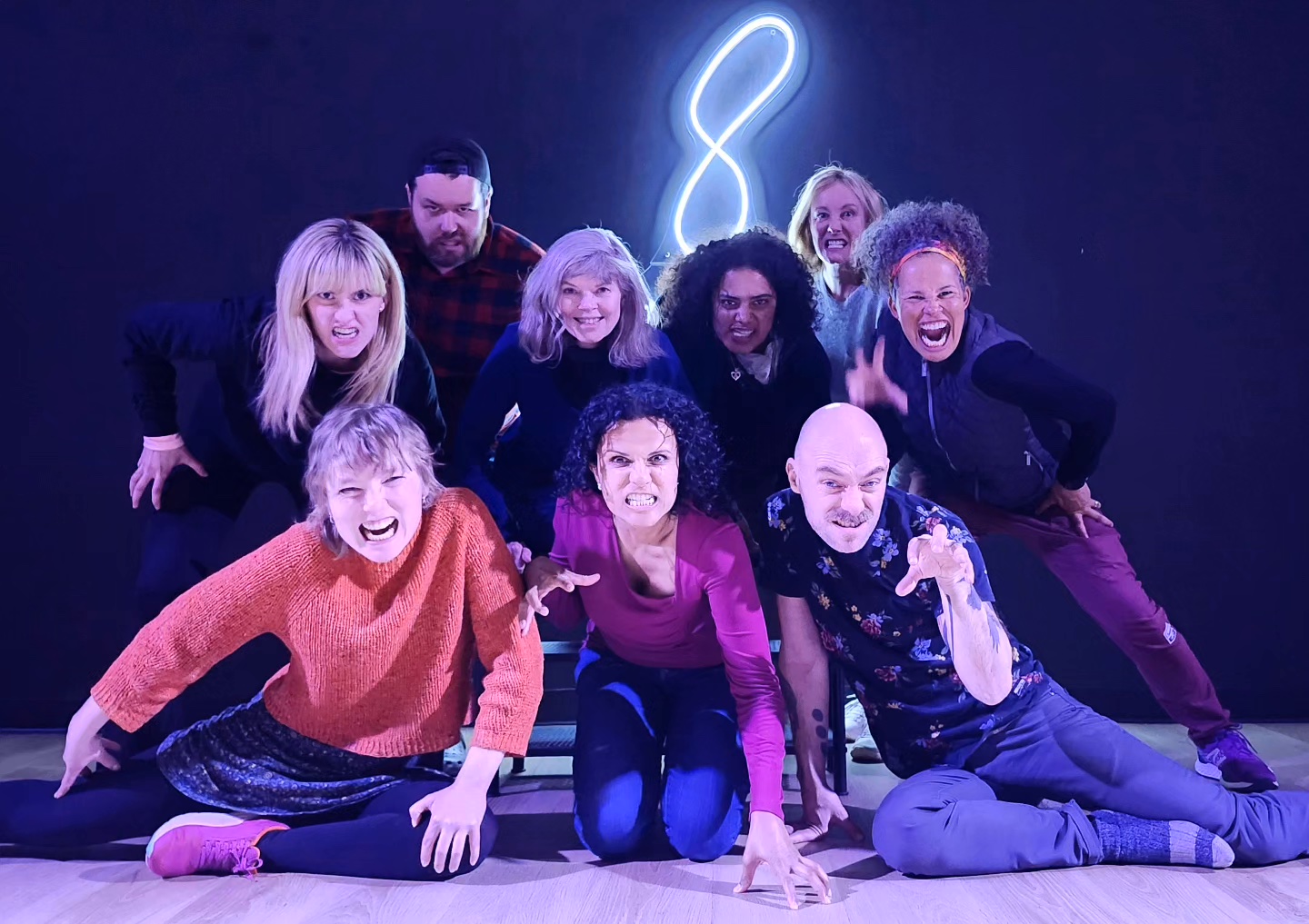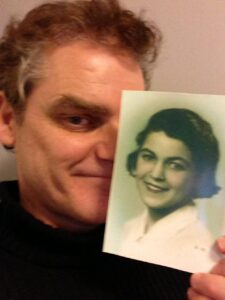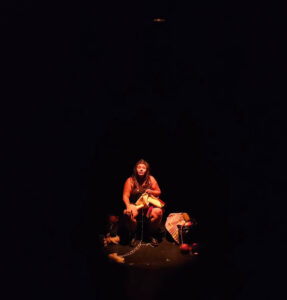
The Cast of Dance Nation.
Keep Good (Theatre) Company in association with Heist opens their production of Clare Barron’s play Dance Nation at Alderney Landing tonight May 22, 2024. The play had its world premiere in 2018 at Playwrights Horizons, was a 2019 finalist for the Pulitzer Prize in Drama, and was the recipient of the Susan Smith Blackburn Prize and The Relentless Award, which was established to honour Philip Seymour Hoffman.
I sat down with director Laura Vingoe-Cram, choreographer Abady Alzahrani, and actor Riel Reddick-Stevens at House of Eights Dance Studio (founded by Alzahrani and where he currently teaches) in Halifax to chat about the show.
The play is both a coming of age story and a sort of Memory Play, about seven thirteen year old competition dancers working hard to bring their best performances and competitive spirits to win Nationals in Tampa, Florida. The twist, as Vingoe-Cram says, is that “these thirteen year old dancers are actually played by older actors (anywhere between 25-69), and the idea is that their younger selves are haunting their older selves. It’s about how the decisions that we make at thirteen can haunt us into the future.”
Choreographer Abady Alzahrani brings his breadth of personal experience to this project. “The competition dance aspect was what really intrigued me, and I was really excited when I got pulled into the project. I did competition dance myself for a few years, and I taught and coached several competition teams as well, so I’m very familiar with the culture that can become so toxic for so many kids.” He also is quick to point out that some of the benefits within this art form include helping teenagers express themselves, achieve greatness, and making friends.
Reddick-Stevens plays Zuzu, the second best dancer on the team. “She has a lot of pressures from everyone in her life- her mother, her dance teacher, her friends, everyone on the team to be the best, and she is definitely feeling the weight of that,” she says.
Vingoe-Cram adds that Zuzu also feels jealously towards Amina, played by Jade Douris-O’Hara, who is the chosen star dancer by Dance Teacher Pat, played by Richie Wilcox. “He is sort of based on Abby Lee Miller from the horrible reality TV show Dance Moms. It’s really interesting because I think they’re sort of forced to grow up really fast, even though their bodies are actually, in many ways, left stunted. They don’t hit puberty (often) until later in their teenhood because they are training so hard. They keep their child-like form, but mentally they are forced to compete and be in these adult arenas and achieve, achieve, achieve, and act more adult than they are.”
Alzahrani agrees, “If you go see a competition dance show you’re watching a thirteen year old dance to a song about a crazy break up, and [you’re] like, “you’ve not experienced this,” and they’re doing these highly deep and emotional dances, and in some unfortunate cases, sometimes, some very sexual dances. That has been a very big conversation within the competition dance world: why is this kid wearing basically nothing and doing this whole combo? Kids are forced to portray adults, and then when they grow up it brings up trauma- and I’m not saying this is the entire competition dance world, there has been a lot of work done to make it great again, but it depends on the studio, it depends on where it is- and this play really kind of dives into the different sides of competition dance, and what makes it so great in some ways, and then problematic in others.”
He notes that some teenage competition dancers dance seven days a week for multiple hours, and thus this limits their ability to do other activities, pursue other hobbies or interests, and really focuses the scope of their futures. “It’s such a short career for dancers,” adds Vingoe-Cram, “and they start so young. It feels like the stakes are so much higher for dancers than for other professions.”
Reddick-Stevens, who started taking theatre classes at four, says that while the pressures on her were lessened because she wasn’t working professionally as a child, she can relate to Zuzu’s focus, and feeling that since she has invested so much time and energy and parts of herself in this one passion, it seems logical to see it through for as long as possible. “As I grew up and went to [theatre] school, because I had been training for so long, on myself there was some pressure to be good, because I had dedicated so much of my life to [acting]. Once you’ve dedicated so much of your life to a specific discipline, then you kind of have to be great, and if you’re not… then what does that mean? There was a point in my life when I was in theatre school when I started to realize that I could have done other things with my life. I do feel like Zuzu feels similarly in that way. It feels like there’s nothing else other than dance.”
Alzahrani mentions that a lot of competition dancers do quit, and that sometimes, as a teacher or a coach, that can be heartbreaking because the teenagers are so talented, and more importantly, love it so much; it’s sad to see their journeys with it come to a premature end. “But luckily those who really do love it do find the love and come back to it after some healing and growing and pursing other things in life, and realizing ‘actually, you know, I really do love dance,’ so they’ll come back to it as an adult. That’s really cool to see.”
Vingoe-Cram mentions that the play also examines the nature of competition and the idea of dancing as a means for winning awards versus as a means to express oneself, and to experience joy and passion. “The play does a really good job of not vilifying competition dance, but not putting it on a pedestal. It’s really looking at it from all these different angles. I think if we zoom out, it’s looking at the nature of competition as something that has been forced upon us in society- the nature of capitalism and patriarchy: you have to win, you have to achieve, in order to survive in this world, and sometimes that means stepping on people you love to get where you want to go. We see one of the characters in the show do that. In order to pursue her dreams, she hurts the people around her. This is a narrative that she’s chosen to pursue, but it’s also a narrative that has been fed to her. And I think it’s really been fed to a lot of us, or all of us, by the patriarchy and capitalism: it’s not about your community, it’s about you reaching your goals. It’s about getting the good job. It’s a very individualistic narrative that we’re fed as a society, and I think Clare is really putting that under a microscope through the lens of competition dance.”
Alzahrani mentions that this same culture exists in a myriad of different disciplines: both in the Arts and in sports. He is also quick to give Laura and I a gentle shift in perspective when we claim to be terrible dancers. “Everyone dances. It’s part of life and culture. It’s really when things became so capitalistic and patriarchal that it became formalized.”
“Seeing different women portray these young girls, [many of whom did not grow up to be dancers], the idea is that this is who they become, this is who they grow into. They are casting their minds back to this very crucial time in their lives, which was a pivotal shift for all the characters, but especially for Zuzu,” says Vingoe-Cram. “It’s also about all the chaos and contradictions of being thirteen: how you’re talking about masturbating in one moment and then horses in the next. I love the way that Clare mishmashes all these things together. It feels chaotic, but being thirteen is chaotic. From getting your period, to your first boyfriend, and first kiss… and everything in between.”
Alzahrani mentions a showcase that he recently had where the teenage dancers were all praying that they would not get their periods the week of the showcase, especially because they were wearing all-white outfits. “That is a genuine fear,” he says, “That’s an extra layer of anxiety that guys maybe don’t have to go through.”
There is one boy on the competition dance team in Dance Nation: Luke, played by Kyle Gillis. Vingoe-Cram tells me that in competition dance you get rated higher just for having a boy on your team. “There’s an episode of Dance Moms that explores this, where the girls are like, ‘No! They have boys on the team! We’re going to lose!’ And the play also explores this. We have Luke, and Luke isn’t an advanced-level dancer, but Dance Teacher Pat knows that [just] having a boy will automatically get them higher marks because so few boys pursue dance.”
Alzahrani adds that in his experience this is slowly changing, but that it is different from studio to studio and city to city. He notes, for one example, that since almost all men in the Philippines dance, that cities with larger Filipino populations tend to have more Filipino men taking dance classes, and pursuing dance as a career. “I think there’s still a long way to go,” he says, “there’s still some bullying for guys who dance, and not just dance… anything that is perceived as feminine.”
Vingoe-Cram notes that between the cast and the crew Dance Nation is a crackerjack team of Nova Scotian talent, and says that, especially since this show is four years in the making, that it’s a big milestone for both Keep Good (Theatre) Company and Heist to produce a show this large in scope.
Dance Nation opens tonight, May 22nd, 2024, at Alderney Landing Theatre, and if you feel inspired to either reconnect with your love of dance, or explore the art form for the first time, House of Eights Dance Studio (5562 Sackville Street) has Drop-In classes.
Keep Good (Theatre) Company and Heist’s production of Dance Nation by Clare Barron plays at Alderney Landing Theatre (2 Ochterloney Street, Dartmouth) from May 22nd to May 26th, 2024. Shows are at 7:30 Wednesday to Saturday with 2:00pm shows on Saturday and Sunday. Tickets are available on a sliding scale ($20, $30, $40) at this link.






